Unit 7 Will people have robots?Section B Language points 课件(共34张PPT)
文档属性
| 名称 | Unit 7 Will people have robots?Section B Language points 课件(共34张PPT) |

|
|
| 格式 | zip | ||
| 文件大小 | 1.8MB | ||
| 资源类型 | 教案 | ||
| 版本资源 | 人教新目标(Go for it)版 | ||
| 科目 | 英语 | ||
| 更新时间 | 2021-11-27 00:00:00 | ||
图片预览

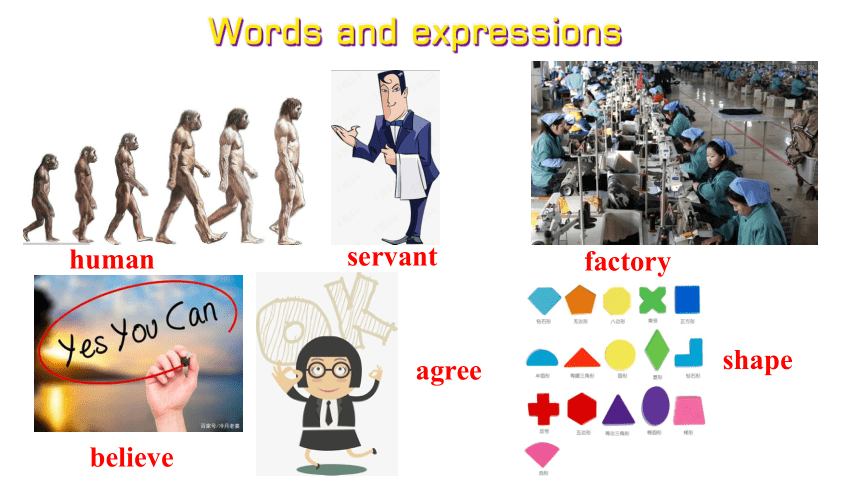
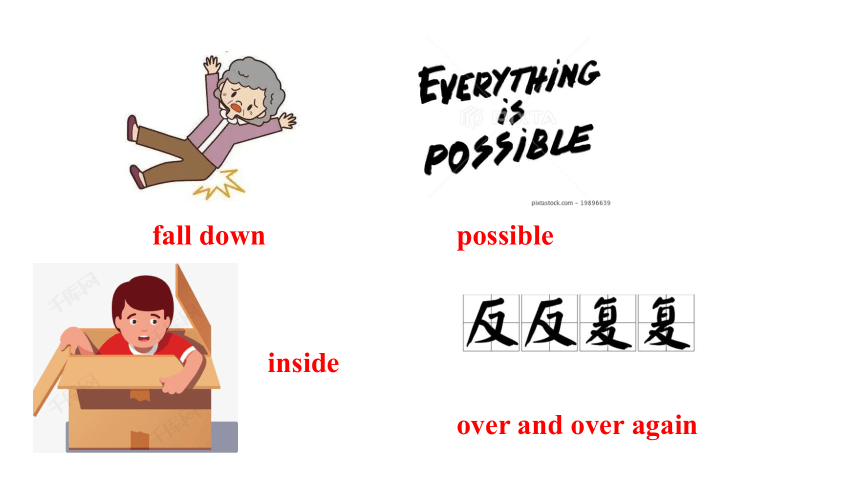
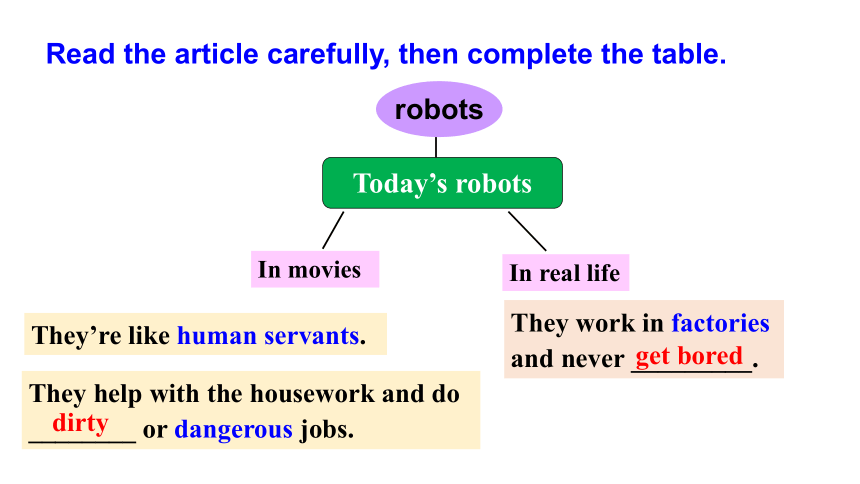
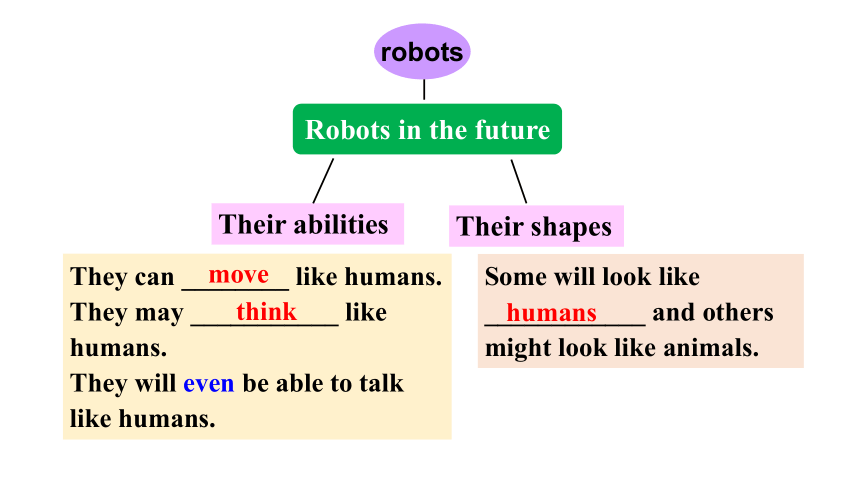
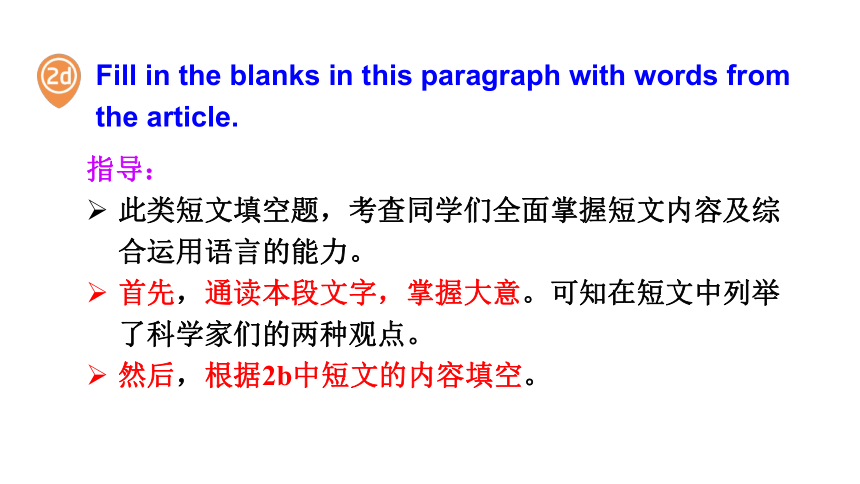
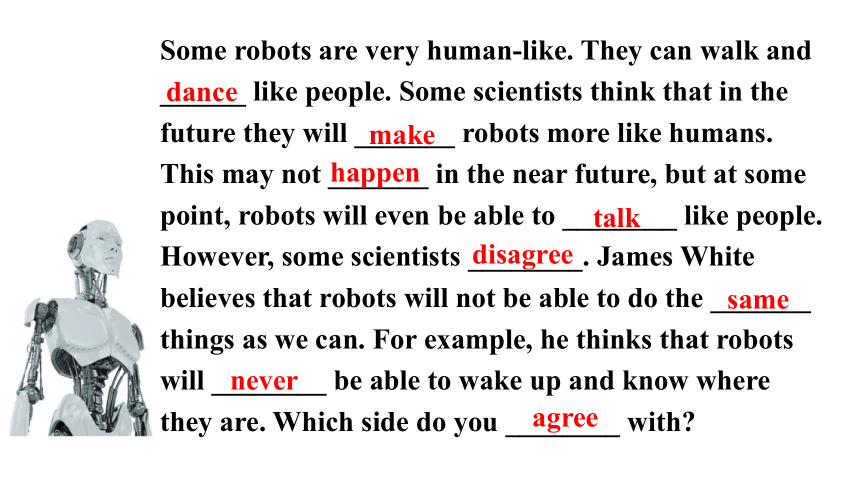
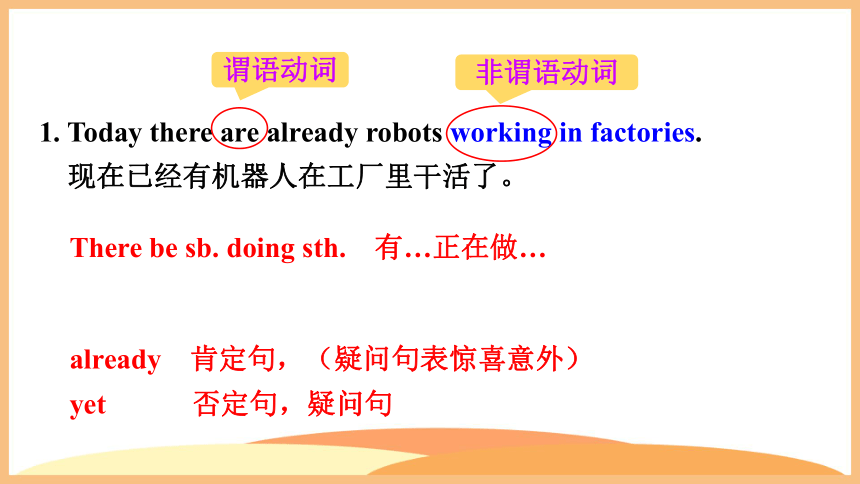
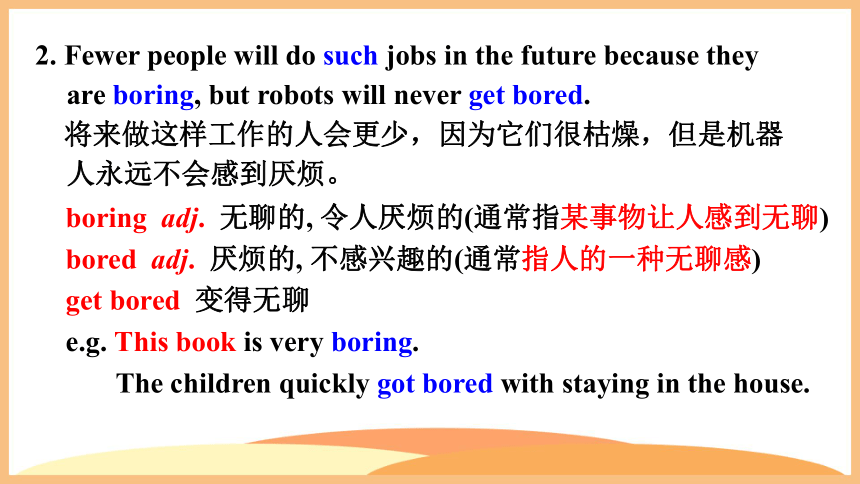
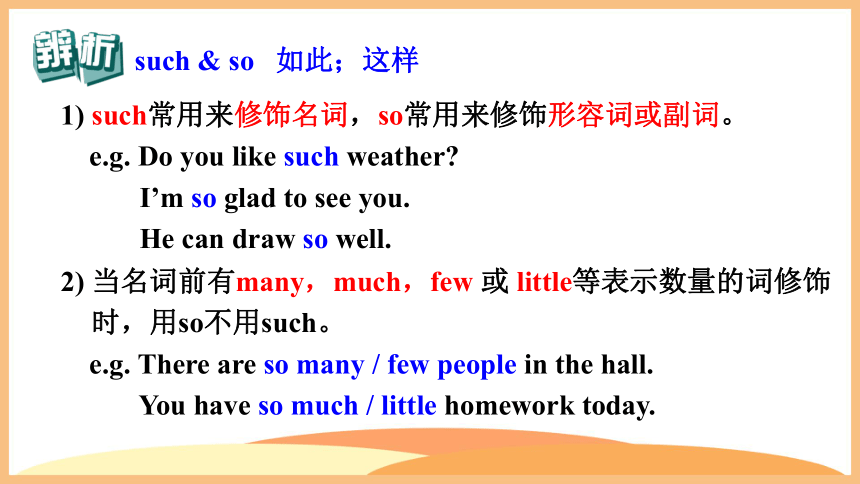
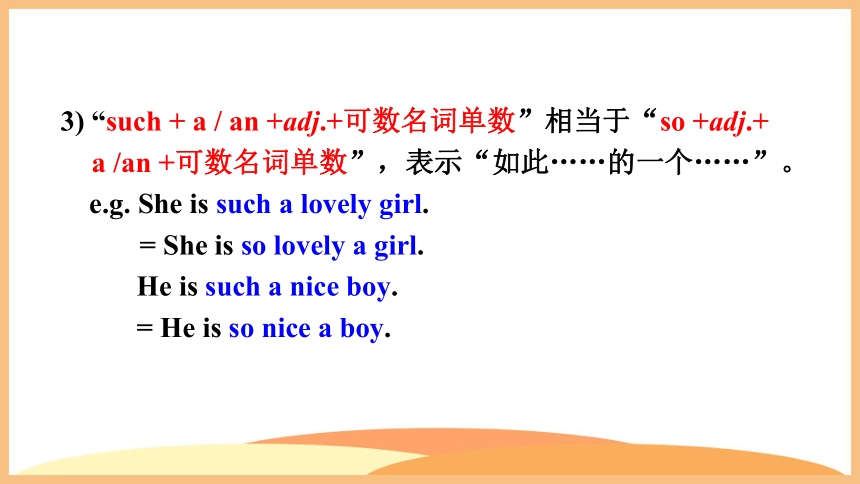
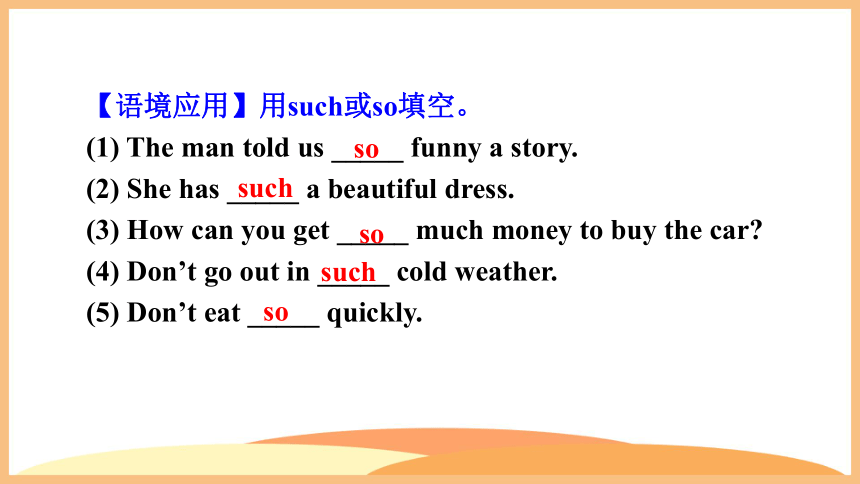
文档简介
(共34张PPT)
human
factory
believe
agree
shape
servant
fall down
possible
inside
over and over again
Read the article carefully, then complete the table.
robots
Today’s robots
In movies
They’re like human servants.
They help with the housework and do ________ or dangerous jobs.
They work in factories and never _________.
In real life
dirty
get bored
robots
Robots in the future
Their shapes
Some will look like ____________ and others might look like animals.
They can ________ like humans.
They may ___________ like humans.
They will even be able to talk like humans.
Their abilities
humans
move
think
Fill in the blanks in this paragraph with words from the article.
指导:
此类短文填空题,考查同学们全面掌握短文内容及综合运用语言的能力。
首先,通读本段文字,掌握大意。可知在短文中列举了科学家们的两种观点。
然后,根据2b中短文的内容填空。
Some robots are very human-like. They can walk and ______ like people. Some scientists think that in the future they will _______ robots more like humans. This may not _______ in the near future, but at some point, robots will even be able to ________ like people. However, some scientists ________. James White believes that robots will not be able to do the _______ things as we can. For example, he thinks that robots will ________ be able to wake up and know where they are. Which side do you ________ with
dance
make
happen
talk
disagree
same
never
agree
1. Today there are already robots working in factories.
现在已经有机器人在工厂里干活了。
There be sb. doing sth. 有…正在做…
谓语动词
非谓语动词
already 肯定句,(疑问句表惊喜意外)
yet 否定句,疑问句
2. Fewer people will do such jobs in the future because they are boring, but robots will never get bored.
将来做这样工作的人会更少,因为它们很枯燥,但是机器人永远不会感到厌烦。
boring adj. 无聊的, 令人厌烦的(通常指某事物让人感到无聊)
bored adj. 厌烦的, 不感兴趣的(通常指人的一种无聊感)
get bored 变得无聊
e.g. This book is very boring.
The children quickly got bored with staying in the house.
1) such常用来修饰名词,so常用来修饰形容词或副词。
e.g. Do you like such weather
I’m so glad to see you.
He can draw so well.
such & so 如此;这样
2) 当名词前有many,much,few 或 little等表示数量的词修饰时,用so不用such。
e.g. There are so many / few people in the hall.
You have so much / little homework today.
3) “such + a / an +adj.+可数名词单数”相当于“so +adj.+ a /an +可数名词单数”,表示“如此……的一个……”。
e.g. She is such a lovely girl.
= She is so lovely a girl.
He is such a nice boy.
= He is so nice a boy.
【语境应用】用such或so填空。
(1) The man told us _____ funny a story.
(2) She has _____ a beautiful dress.
(3) How can you get _____ much money to buy the car
(4) Don’t go out in _____ cold weather.
(5) Don’t eat _____ quickly.
so
such
so
such
so
3. Some scientists believe that although we can make robots move like people, it will be difficult to make them really think like a human. (翻译)
一些科学家认为,尽管我们能够让机器人像人一样活动,却很难让它们真的像人类那样思考。
although引导的状语从句
It is / was / will be difficult to do sth. 做什么事情是/将会很难
e.g. It will be very difficult to stop the virus (病毒) for that country.
believe sb. 相信某人说的话
believe sth. 相信某事会发生(或已经发生)
e.g. I don’t believe you.
You shouldn’t believe everything you read. Sometimes, you need to find out the truth by yourself.
believe v. 相信;认为有可能
believe in 信赖, 相信
believe in sb. 信任某人
believe in (doing) sth. 相信(做)……有用; 相信(做)……正确
e.g. Believe in yourself, or you’ll never succeed.
相信自己,否则你永远不会成功。
I believe in working hard to achieve (获得) success.
我相信努力就会获得成功。
否定前移
将think, believe, suppose, expect, fancy, imagine等动词后面宾语从句的否定词转移到主句中,即主句的谓语动词用否定式,而从句的谓语动词用肯定式。
I don't think I know you. 我想我并不认识你。
I don' t believe he will come. 我相信他不回来。
【语境应用】根据句意,用believe或believe in的适当形式、
填空。
(1) I ________ what he said just now, but I never __________ him as a person.
(2) I couldn’t ________ my eyes when she walked into the room.
believe
believe in
believe
4. But many scientists disagree with Mr. White.
很多科学家不同意怀特先生的观点。
However, they agree it may take hundreds of years.
然而,他们认为这可能需要数百年的时间。
前缀(dis-) + agree (同意)→disagree
agree v. 同意;赞成;应允
disagree v. 不同意 ;持不同意见;有分歧
agree with sb. 同意某人的意见
agree to do sth. 同意做某事
agree to plan/idea/suggestion…
agree on sth. 就…取得一致意见
e.g. I agree with you on this matter./ I agree with your idea.
He agreed to fly kites with me this weekend.
They all agree on the matter.
Please agree to this plan.
agree that 从句 (that可省略),同意……;一致认为……
e.g. They agree (that) the movie is very boring.
My parents agree (that) I can join the army when I finish university.
【语境应用】请将下面的汉语句子翻译为英语。
(1) Tom同意帮我了。
(2) 我同意你的意见。
(3)我们都一致认为他在会上的建议很好。
Tom agreed to help me.
I agree with you.
We all agreed that his suggestion at the meeting is good.
hundreds of 数以百计的;成百上千的
后接可数名词复数形式
e.g. There are hundreds of pigs on the farm.
当hundred受数词或不定数量词修饰时,hundred用原形。
e.g. 三百 → three hundred
几百→ several hundred
【语境应用】根据汉语意思完成英语句子,每空一词(数词
用英语表达)。
(1) 这家餐厅有二百张桌子。
________ _________ tables are in this dining hall.
(2) 昨天有成百上千的人来这个镇上观看赛车比赛。
Yesterday _________ _________ people came to the town to watch the car race.
Two hundred
hundreds of
5. If buildings fall down with people inside, these snake robots can help look for people under the buildings.
如果建筑物倒塌了,并且还有人在里面,这些蛇形机器人能够帮助搜寻埋在建筑物下面的人。
if引导的条件状语从句
fall vi. (侧重由于重力作用或失去平衡而)跌倒
fall down 摔倒,跌倒
e.g. Lisa fell down and hurt her knee.
fall over 倒下,绊倒
fall behind 落后;跟不上
fall off (从某物上)掉下,脱落
fall ill 生病
fall asleep 进入梦乡;睡着
fall in love with 爱上
e.g. She fell over the dog and broke her front teeth.
I don't want to fall behind in my studies.
The boy fell off the tree yesterday.
【语境应用】选词语填空。
fall behind, fall asleep, fall down, fall off
(1) John never climbs trees because he once ____________ from a tree when he was a little boy.
(2) I found my phone in the end. It ____________ the bed.
(3) After changing (换) the bed, Helen ____________quickly.
(4) She was ill for six weeks and ____________ with her schoolwork.
fell asleep
fell off
fell down
fell behind
look for 寻找;寻求
e.g. —What are you doing, Li Juan
—I’m looking for my pet dog.
词条 意思及用法
look for “寻找;寻求”,强调找的动作
find “找到;发现”,注重找的结果
find out “找出;发现;查明”,指通过观察、探索或调研之后搞清楚、弄明事情的真相
look for, find, find out
e.g. Mary found her book under the bed.
The teacher wanted to find out why Tom was late for school.
【语境应用】
根据句意用find, look for 或find out的适当形式填空。
(1) Finally, Miss Li ___________ her skirt in a box in her bedroom.
(2) The boy is ____________ his basketball in the classroom.
(3) Mr. Wang asked his son to ____________ what time the train leaves.
found
looking for
find out
6. This was not possible for 20 years ago, but computers and rockets also seemed impossible 100 years ago.
这在20年前还是不可能发生的事,不过在100年以前,电脑、火箭看上去似乎也是不可能的。
possible adj. 可能存在或发生的;可能的
副词形式为possibly,反义词为impossible。
常用句型为It’s possible that ...和It’s possible for sb. to do sth.。
as… as possible 尽可能… 地
as soon as possible as fast as possible as early as possible
【语境应用】完成句子
(1) 有可能人类会居住在火星。
______ _________ _______ man will live on Mars.
(2) 他早点走可能吗?
Will _______ _______ _______ _______ him to leave early
(3) 你可能拿了我的钥匙而不是你的。
You __________ picked up my keys instead of yours.
(4)请尽快把它寄出去。
Please send it_____________.
It’s possible that
it be possible for
possibly
as soon as possible
7. Some robots are very human-like.
-like 形容词后缀,用在名词之后,与其构成一个完整的形容词,表示“类似……的;像……一样的;有……特征的”
本单元中出现的其他like:
① What will robots be like in the future
What’s sb. / sth. like 某人 / 某物怎么样?
既可询问某人的性格品质或某物的特征,也可询问某人的外貌或某物的外形。
What does sb. / sth. look like
只可询问某人的外貌或某物的外形。
② ..., it will be difficult to make them really think like a human.
like prep. 相似;类似;像,相当于similar to
③ They help with the housework and do jobs like working in dirty or dangerous places.
like prep. 例如,相当于such as
【语境应用】英译汉
(1) She was like a sister to me.
(2) What will your job be like
(3) Mike often does sports on the weekend like swimming and playing basketball.
(4) I think dragons are snake-like animals.
她待我就像姐姐一样。
你的工作会是怎样的?
Mike周末经常运动,比如游泳和打篮球。
我认为龙是像蛇一样的动物。
human
factory
believe
agree
shape
servant
fall down
possible
inside
over and over again
Read the article carefully, then complete the table.
robots
Today’s robots
In movies
They’re like human servants.
They help with the housework and do ________ or dangerous jobs.
They work in factories and never _________.
In real life
dirty
get bored
robots
Robots in the future
Their shapes
Some will look like ____________ and others might look like animals.
They can ________ like humans.
They may ___________ like humans.
They will even be able to talk like humans.
Their abilities
humans
move
think
Fill in the blanks in this paragraph with words from the article.
指导:
此类短文填空题,考查同学们全面掌握短文内容及综合运用语言的能力。
首先,通读本段文字,掌握大意。可知在短文中列举了科学家们的两种观点。
然后,根据2b中短文的内容填空。
Some robots are very human-like. They can walk and ______ like people. Some scientists think that in the future they will _______ robots more like humans. This may not _______ in the near future, but at some point, robots will even be able to ________ like people. However, some scientists ________. James White believes that robots will not be able to do the _______ things as we can. For example, he thinks that robots will ________ be able to wake up and know where they are. Which side do you ________ with
dance
make
happen
talk
disagree
same
never
agree
1. Today there are already robots working in factories.
现在已经有机器人在工厂里干活了。
There be sb. doing sth. 有…正在做…
谓语动词
非谓语动词
already 肯定句,(疑问句表惊喜意外)
yet 否定句,疑问句
2. Fewer people will do such jobs in the future because they are boring, but robots will never get bored.
将来做这样工作的人会更少,因为它们很枯燥,但是机器人永远不会感到厌烦。
boring adj. 无聊的, 令人厌烦的(通常指某事物让人感到无聊)
bored adj. 厌烦的, 不感兴趣的(通常指人的一种无聊感)
get bored 变得无聊
e.g. This book is very boring.
The children quickly got bored with staying in the house.
1) such常用来修饰名词,so常用来修饰形容词或副词。
e.g. Do you like such weather
I’m so glad to see you.
He can draw so well.
such & so 如此;这样
2) 当名词前有many,much,few 或 little等表示数量的词修饰时,用so不用such。
e.g. There are so many / few people in the hall.
You have so much / little homework today.
3) “such + a / an +adj.+可数名词单数”相当于“so +adj.+ a /an +可数名词单数”,表示“如此……的一个……”。
e.g. She is such a lovely girl.
= She is so lovely a girl.
He is such a nice boy.
= He is so nice a boy.
【语境应用】用such或so填空。
(1) The man told us _____ funny a story.
(2) She has _____ a beautiful dress.
(3) How can you get _____ much money to buy the car
(4) Don’t go out in _____ cold weather.
(5) Don’t eat _____ quickly.
so
such
so
such
so
3. Some scientists believe that although we can make robots move like people, it will be difficult to make them really think like a human. (翻译)
一些科学家认为,尽管我们能够让机器人像人一样活动,却很难让它们真的像人类那样思考。
although引导的状语从句
It is / was / will be difficult to do sth. 做什么事情是/将会很难
e.g. It will be very difficult to stop the virus (病毒) for that country.
believe sb. 相信某人说的话
believe sth. 相信某事会发生(或已经发生)
e.g. I don’t believe you.
You shouldn’t believe everything you read. Sometimes, you need to find out the truth by yourself.
believe v. 相信;认为有可能
believe in 信赖, 相信
believe in sb. 信任某人
believe in (doing) sth. 相信(做)……有用; 相信(做)……正确
e.g. Believe in yourself, or you’ll never succeed.
相信自己,否则你永远不会成功。
I believe in working hard to achieve (获得) success.
我相信努力就会获得成功。
否定前移
将think, believe, suppose, expect, fancy, imagine等动词后面宾语从句的否定词转移到主句中,即主句的谓语动词用否定式,而从句的谓语动词用肯定式。
I don't think I know you. 我想我并不认识你。
I don' t believe he will come. 我相信他不回来。
【语境应用】根据句意,用believe或believe in的适当形式、
填空。
(1) I ________ what he said just now, but I never __________ him as a person.
(2) I couldn’t ________ my eyes when she walked into the room.
believe
believe in
believe
4. But many scientists disagree with Mr. White.
很多科学家不同意怀特先生的观点。
However, they agree it may take hundreds of years.
然而,他们认为这可能需要数百年的时间。
前缀(dis-) + agree (同意)→disagree
agree v. 同意;赞成;应允
disagree v. 不同意 ;持不同意见;有分歧
agree with sb. 同意某人的意见
agree to do sth. 同意做某事
agree to plan/idea/suggestion…
agree on sth. 就…取得一致意见
e.g. I agree with you on this matter./ I agree with your idea.
He agreed to fly kites with me this weekend.
They all agree on the matter.
Please agree to this plan.
agree that 从句 (that可省略),同意……;一致认为……
e.g. They agree (that) the movie is very boring.
My parents agree (that) I can join the army when I finish university.
【语境应用】请将下面的汉语句子翻译为英语。
(1) Tom同意帮我了。
(2) 我同意你的意见。
(3)我们都一致认为他在会上的建议很好。
Tom agreed to help me.
I agree with you.
We all agreed that his suggestion at the meeting is good.
hundreds of 数以百计的;成百上千的
后接可数名词复数形式
e.g. There are hundreds of pigs on the farm.
当hundred受数词或不定数量词修饰时,hundred用原形。
e.g. 三百 → three hundred
几百→ several hundred
【语境应用】根据汉语意思完成英语句子,每空一词(数词
用英语表达)。
(1) 这家餐厅有二百张桌子。
________ _________ tables are in this dining hall.
(2) 昨天有成百上千的人来这个镇上观看赛车比赛。
Yesterday _________ _________ people came to the town to watch the car race.
Two hundred
hundreds of
5. If buildings fall down with people inside, these snake robots can help look for people under the buildings.
如果建筑物倒塌了,并且还有人在里面,这些蛇形机器人能够帮助搜寻埋在建筑物下面的人。
if引导的条件状语从句
fall vi. (侧重由于重力作用或失去平衡而)跌倒
fall down 摔倒,跌倒
e.g. Lisa fell down and hurt her knee.
fall over 倒下,绊倒
fall behind 落后;跟不上
fall off (从某物上)掉下,脱落
fall ill 生病
fall asleep 进入梦乡;睡着
fall in love with 爱上
e.g. She fell over the dog and broke her front teeth.
I don't want to fall behind in my studies.
The boy fell off the tree yesterday.
【语境应用】选词语填空。
fall behind, fall asleep, fall down, fall off
(1) John never climbs trees because he once ____________ from a tree when he was a little boy.
(2) I found my phone in the end. It ____________ the bed.
(3) After changing (换) the bed, Helen ____________quickly.
(4) She was ill for six weeks and ____________ with her schoolwork.
fell asleep
fell off
fell down
fell behind
look for 寻找;寻求
e.g. —What are you doing, Li Juan
—I’m looking for my pet dog.
词条 意思及用法
look for “寻找;寻求”,强调找的动作
find “找到;发现”,注重找的结果
find out “找出;发现;查明”,指通过观察、探索或调研之后搞清楚、弄明事情的真相
look for, find, find out
e.g. Mary found her book under the bed.
The teacher wanted to find out why Tom was late for school.
【语境应用】
根据句意用find, look for 或find out的适当形式填空。
(1) Finally, Miss Li ___________ her skirt in a box in her bedroom.
(2) The boy is ____________ his basketball in the classroom.
(3) Mr. Wang asked his son to ____________ what time the train leaves.
found
looking for
find out
6. This was not possible for 20 years ago, but computers and rockets also seemed impossible 100 years ago.
这在20年前还是不可能发生的事,不过在100年以前,电脑、火箭看上去似乎也是不可能的。
possible adj. 可能存在或发生的;可能的
副词形式为possibly,反义词为impossible。
常用句型为It’s possible that ...和It’s possible for sb. to do sth.。
as… as possible 尽可能… 地
as soon as possible as fast as possible as early as possible
【语境应用】完成句子
(1) 有可能人类会居住在火星。
______ _________ _______ man will live on Mars.
(2) 他早点走可能吗?
Will _______ _______ _______ _______ him to leave early
(3) 你可能拿了我的钥匙而不是你的。
You __________ picked up my keys instead of yours.
(4)请尽快把它寄出去。
Please send it_____________.
It’s possible that
it be possible for
possibly
as soon as possible
7. Some robots are very human-like.
-like 形容词后缀,用在名词之后,与其构成一个完整的形容词,表示“类似……的;像……一样的;有……特征的”
本单元中出现的其他like:
① What will robots be like in the future
What’s sb. / sth. like 某人 / 某物怎么样?
既可询问某人的性格品质或某物的特征,也可询问某人的外貌或某物的外形。
What does sb. / sth. look like
只可询问某人的外貌或某物的外形。
② ..., it will be difficult to make them really think like a human.
like prep. 相似;类似;像,相当于similar to
③ They help with the housework and do jobs like working in dirty or dangerous places.
like prep. 例如,相当于such as
【语境应用】英译汉
(1) She was like a sister to me.
(2) What will your job be like
(3) Mike often does sports on the weekend like swimming and playing basketball.
(4) I think dragons are snake-like animals.
她待我就像姐姐一样。
你的工作会是怎样的?
Mike周末经常运动,比如游泳和打篮球。
我认为龙是像蛇一样的动物。
同课章节目录
- Unit 1 Where did you go on vacation?
- Section A
- Section B
- Unit 2 How often do you exercise?
- Section A
- Section B
- Unit 3 I'm more outgoing than my sister.
- Section A
- Section B
- Unit 4 What's the best movie theater?
- Section A
- Section B
- Unit 5 Do you want to watch a game show?
- Section A
- Section B
- Unit 6 I'm going to study computer science.
- Section A
- Section B
- Unit 7 Will people have robots?
- Section A
- Section B
- Unit 8 How do you make a banana milk shake?
- Section A
- Section B
- Unit 9 Can you come to my party?
- Section A
- Section B
- Unit 10 If you go to the party, you'll have a grea
- Section A
- Section B
